North Beach — Padre Island National Seashore
Right on the beach
Nice stretch of beach. No amenities. Only a few other campers at a good distance. My truck and camper are very dirty from the sea mist and sand, but that's a small price.
Corpus Christi offers a mix of coastal and inland camping experiences across the Texas Gulf Coast. Mustang Island State Park Campground provides waterfront camping with beach access and developed sites for tents and RVs, while areas like North Beach at Padre Island National Seashore offer more primitive dispersed camping options. The region includes several RV resorts with full hookups, particularly in Port Aransas and along the barrier islands, as well as county parks with varying levels of amenities.
Access to campground facilities varies considerably across the region, with many waterfront sites experiencing strong coastal winds. Several campgrounds have concrete pads and full hookups for RVs, though limited shade is common throughout the area. "Being that this is Texas, it's super hot all day and all night long. It's worse when there is no shade to shield you. Although the breeze is great off of the water, shade would be nice," noted one camper about Mustang Island. Beach camping areas like Port Aransas Permit Beach require special permits, and campers should be prepared for wind and salt exposure that can affect equipment. Weather conditions can change rapidly, especially during hurricane season from June through November.
The Gulf Coast setting provides distinctive camping experiences centered around beach access and water activities. Campers frequently mention the appeal of oceanfront locations despite challenging conditions. According to one visitor, "One side is the bay and the other is the ocean, lovely water views everywhere." Military personnel have access to NAS RV Park Corpus Christi (also known as Shields Park), which receives positive reviews for its spacious sites and bay views. Developed campground options range from basic county parks to private RV resorts with amenities like swimming pools and laundry facilities. The camping areas near Corpus Christi provide varying levels of privacy, with some sites offering little separation between neighbors while others feature more spacious layouts. Most beach camping zones have minimal natural shade, so awnings and portable shade structures are recommended for daytime comfort.
$25 / night
"Being that this is Texas, it's super hot all day and all night long. It's worse when there is no shade to shield you. Although the breeze is great off of the water, shade would be nice."
"Nothing like the beaches that you'll find elsewhere in Corpus Christi."
"I love this site Best in Texas, you can see and hear the ocean from your tent, and its on the Island so there are a lot of attractions for visitors."
"You can drive or walk to the beach, the new pier is still under construction but you can peacefully walk for miles and enjoy excellent views of sunrise!"
"Tables set up to be behind your rv. Kind of a strange setup. Showers and baths were clean. Laundry on site. Somewhat protected by dunes. No view of water. Pretty cheap and good access to beach."
"It is large and paved, good amenities, good access to the beach. The beach spans the entire gulf coast if you are interested in walking from Florida to Mexico."
$43 - $80 / night
"This place is centrally located near a lot of services and activities. There's lots of pavement, which is not a huge selling point, but the dust is greatly reduced as a result."
"The park is close to H-E-B and not too far from multiple beaches."
"Port Aransas Beach On Rt 361 Texas near Corpus Christi. This entire area is awesome and windy :) Worth the drive and you can easily spend a week here and not visit all of the areas."
"Beautiful beaches, some of the clearest water you will find in Texas. Head towards the state park for quieter crowds. Swim at your own risk!"
"Just outside of Corpus Christi in a slightly more remote stretch of Texas coast rests Padre Island National Seashore, a beachfront land preserve operated by the United States Park System that offered a"
"We spend a couple months camping at tons of parks around Texas and this was by far my favorite scenery from the site- the waves crashing :) The sites were quite close together, but the park was not very"
$47 - $68 / night
"Firefly Coastal Bend Resort in Corpus Christi is the perfect getaway! The resort is incredibly family-friendly and pet-friendly, making it an ideal destination for everyone."
"This was the perfect place to stay in proximity of our son's house. Nice, clean campground with bay views , great sunrise and sunset. The only negative is you have to prepay your stay 10 in advance ."
$12 - $20 / night
"Potholes are horrible in some areas. 2nd the picnic tables are so rusted through that many are unusable. 3rd the goat heads or grass burrs are a nightmare especially if you step on one in the middle"
"Wi-Fi was nearly unusable but T-Mobile 5G was over 200Mbps down and perfect for working remotely."
"It is adjacent to the nature preserve, which gives it a feeling of seclusion. This campground is close to restaurants and stores."
"They are back up to a game reserve that is next to a small airport. Lots of birds to see. We even seen ski divers. The pools and rec centers are top notch. Home town feel everywhere you go."
"Easy walking distance to the beach just over the dunes with a cart path."
"We were there through the bid cold snap Texas suffered in February. Everyone there was helpful and just great to be with. The staff is first class."
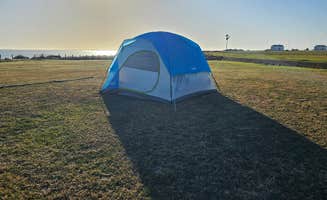
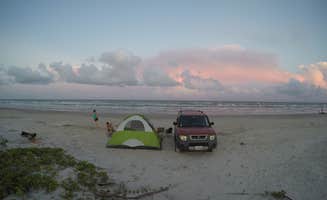
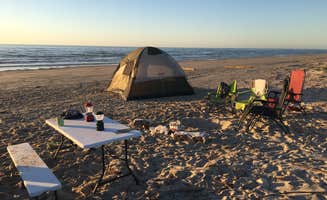
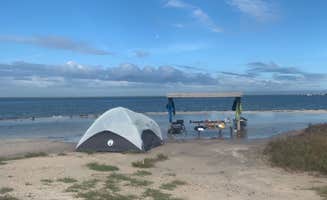
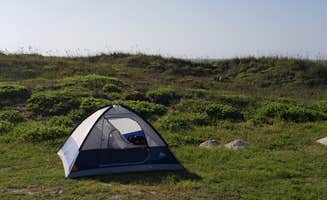
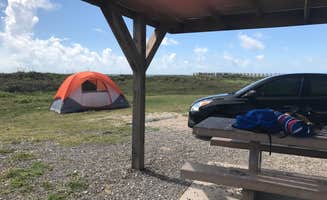
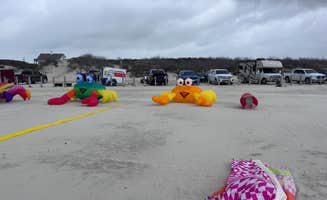
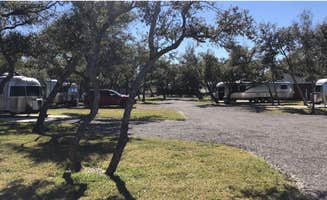
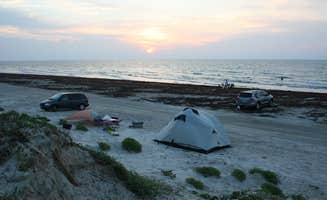
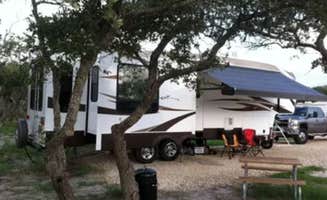
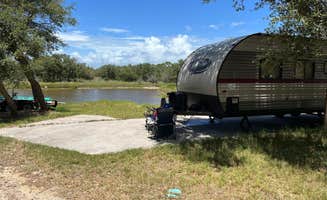
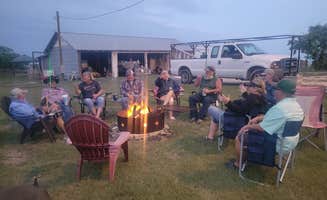
Nice stretch of beach. No amenities. Only a few other campers at a good distance. My truck and camper are very dirty from the sea mist and sand, but that's a small price.
I have been at E.Z. Living rv park in Corpus Christi Texas for almost 3 months. It has a laundry room and mail room. Very quiet park. The people here have been very welcoming and will help you with anything. The owners are salt of the earth people who are very helpful and welcoming. The lake can be seen from the park and will take you about 4 minutes to walk to the water. Great people, great location. Will definitely revisit. 5 stars.
We stayed 2 weeks for a great Winter rate. We had a 50 Amp site and this area was wonderful. You can drive or walk to the beach, the new pier is still under construction but you can peacefully walk for miles and enjoy excellent views of sunrise!
This park is convenient to Corpus Christi if you need something from any store, it’s close. We did go to the Texas Aquarium and that was great too.
We visited the Malaquite Visitor Center just south in the Padre National Seashore. This and Bird Island are good stops!
The park is very convenient from the bridge and check in was a breeze. They don’t assign spots until you arrive and their confirmation process is pretty low key, but all was very organized and staff was informative.
While we were there we also saw a turtle release on Padre Island, which was very exciting.
It got very very cold while we were there so we’re quite appreciative of those 50 amps to keep warm! Great large beautiful park!
Easy access to parking, picked up our permit at a Strpes Station in town. Walk out your door to sunrise and the beautiful wide beaches. We were lucky to arrive early for the Kite Festival because the weather leading up to festival was better than the Festival Day itself. Met lots of nice people, the beach and parking can get a little busy, but when it is just the RVs left at the end of the day it is nice and quiet. We felt comfortable and safe.
Tip: if Grannie’s Tamales comes by in their little white van selling fresh tamales…say YES they are delicious!
We will surely be back. Beautiful visit!
You can walk for days and I almost forgot to mention the Bollard Buddies/Yarn Bombing of the bollards by the pier. Hundreds of them…very creative and fun.
I booked this spur of the moment for myself. I wanted to tent camp someplace with easy access to finding Whooping cranes. This was perfect. Great campsite, plenty of privacy, water available at the campsite. Great restroom facilities within a short walk. Two shower stalls - clean, plenty of dyer pressure and hot water, outer bench for organizing clots and toiletries. Big Tree was only a couple of miles away, easy to get to for morning light photography. I Abslotuly loved this campsite for this time of year. It was humid so things were pretty water soaked in the mornings out of the tent but it's coastal camping.
Stayed here for a couple months in December and January. Lovely place! Hosts are great. Neighbors are great. Port A is fun to be next to and walking to the beach is super fast and easy.
This place is amazing. I would stay a month if I could. Nice sand, close to town. Just want to say there were no coyotes and no crazy meter maid as stated in other comments. Only giving it a 4 because of all the confusing info on length of stay. You can dump and fill at I B Magee beach county park for $10 cash preferred. They are there 8am to 6pm
Great park, roomy sites, bit of noise in the morning when the airboats are leaving. I imagine that's worse on the sites next to the water. Bathrooms/showers were adequate/clean. Hiking/biking trails around and thru the campground. Really big park, lots of Live Oaks. Weather was HUMID (we'refrom CO...) but not too hot. This park is about a 40min drive from Aransas NWR. so perfect for us!
This is a city park and requires a free permit that you can obtain from city hall or request through email which ca be found on the city website. The park is clean enough and there are garbage cans and covered picnic tables. The spots are easy to access with packed gravel pads. The canal is interesting with bird and fish life but that’s about it. There is loud highway traffic but it’s a solid spot for an overnight. It was the perfect for some truck repair we needed to take care of.
The Corpus Christi camping area encompasses both barrier islands and inland waterways along the Texas Gulf Coast. This region experiences strong prevailing winds year-round, with winter temperatures averaging 55-70°F and summer temperatures regularly exceeding 90°F with high humidity. Salt exposure from coastal air affects camping equipment, requiring more frequent cleaning and maintenance than inland locations.
Horseback riding on beaches: Available near Port Aransas Permit Beach, where campers can enjoy wildlife viewing alongside beach riding. "Great spot to pull up set a tent up or pull your own camper in. Just get a $12 parking permit at the stripes gas station and you're good to stay over night!" notes Tiffany S.
Sea turtle conservation: Visit rescue facilities near Mustang Island. "Visit the Sea Turtle Rescue site further down the coast," suggests Gretchen N. when staying at Mustang Island. The center offers educational programs about endangered Kemp's ridley sea turtles that nest in the area.
Fishing from piers: Bob Hall Pier provides fishing access near Padre Balli County Park. "County park close to the pier with a place to eat and drink," mentions Chris P. The pier extends 1,240 feet into the Gulf with no fishing license required.
Waterfront camping options: Sites with direct water views are highly rated. "One side is the bay and the other is the ocean, lovely water views everywhere," describes Kayla M. about Mustang Island State Park Campground. The park features both gulf-facing and bay-side camping areas.
Beach driving access: Several areas permit vehicles directly on beaches. "You can drive right on the beach like a highway, in fact people do even in big rigs. You can park right on the beach," explains Starseed P. This allows campers to position equipment closer to the water than at typical coastal campgrounds.
Protected camping behind dunes: Wind barriers improve comfort in this breezy region. "Loved that the beach was walking distance from camp, but the sites were guarded by the dunes. Really helped fend off the wind," reports one camper at Mustang Island. These natural windbreaks provide critical protection while maintaining easy beach access.
Sand burr challenges: Several campgrounds have painful grass burrs that affect both humans and pets. "The goat heads or grass burrs are a nightmare especially if you have dogs... they absolutely can't run in the grass," warns a camper at NAS RV Park Corpus Christi. Bringing leaf blowers to clear concrete pads helps manage this issue.
Limited stay requirements: Beach camping areas have time restrictions. "You have to move every 3 days. Got very busy during spring break weekend, otherwise quiet," notes mark F. about Port Aransas Beach. Most permit areas enforce these limits to prevent long-term occupation.
Salt damage concerns: Proximity to ocean affects equipment. "There are times when it's so thick you could use an ice scraper," reports a camper regarding salt buildup on vehicles. Campers should plan for post-trip cleaning to prevent corrosion damage.
Boardwalk beach access: Easier for children with gear at Pioneer Beach Resort. "Best part is the boardwalk to the beach where you can drive over with your golf cart," explains Nicole K. These elevated walkways protect dune ecosystems while providing convenient beach access.
Child-friendly wildlife opportunities: Evening crab hunting provides entertainment. "One of my favorite places in the park was the recreational area further inland. Beautiful sunset and lots of crabs to catch!" shares a visitor to Mustang Island. Ghost crab viewing is particularly good after sunset with flashlights.
Swimming pool alternatives: When ocean conditions are rough, on-site pools provide safer swimming. "They have 2 wonderful swimming pools that are heated," notes Sheila C. about Pioneer Beach Resort, making it suitable for family swimming year-round regardless of Gulf conditions.
Electrical outages: Power reliability concerns exist throughout the region. "At about 8:40pm we heard a loud report, similar to a shotgun blast. The whole park lost power, i think a transformer blew up," reports Pedro C. at Padre Balli County Park. Having generator backup or alternative power sources is advisable.
Wind preparation essential: Retract awnings and consider bringing in slides during high winds. "The winds here can reach 60 mph. Just prepare for it by never leaving awnings out and when bad bring slides in so awning toppers don't get ripped off," advises a camper at Firefly Coastal Bend- Corpus Christi. Stabilizing equipment becomes crucial during common coastal wind events.
Concrete pad availability: Many campgrounds offer hard-surface sites helpful for leveling. "Sites are level and functional," notes a camper at Padre Balli County Park. These pads provide stability in sandy soil conditions common to coastal camping.
Frequently Asked Questions
Where can I find tent camping in Corpus Christi?
Tent camping enthusiasts have several excellent options around Corpus Christi. Mustang Island State Park Campground offers beachfront tent camping with picnic tables and well-maintained shower facilities. The beach is notably cleaner than other Corpus Christi beaches. For a more primitive experience, South Beach — Padre Island National Seashore provides dispersed camping right on the beach with opportunities for fishing, sunbathing, bird watching, and photography. Padre Balli County Park also offers tent camping, as does Malaquite Campground on Padre Island National Seashore, which provides more amenities for tent campers.
What campgrounds are available in Corpus Christi?
Corpus Christi offers a diverse range of camping options. Within the city, you'll find Hatch RV Park with level concrete pads and full hookups, just 12-15 minutes from downtown and North Beach. For a more luxurious experience, Firefly Coastal Bend- Corpus Christi features a private beach, excellent fishing spots, and is both family and pet-friendly. Other options include Bay View RV Resort, Sea Breeze RV Community Resort, and Colonia Del Rey RV Park. The area also has several campgrounds with beach access, state parks, and RV resorts that cater to different preferences and budgets.
How far are campgrounds from Corpus Christi?
Campground distances from Corpus Christi vary widely. Port Aransas Permit Beach is located on Route 361 near Corpus Christi, requiring a short drive but offering excellent coastal camping. Rob and Bessie Welder Park is situated in Sinton, approximately 25-30 minutes from Corpus Christi. Lake Corpus Christi State Park is about 35 miles northwest of the city in Mathis. For those wanting closer options, there are several RV parks within the city limits, including Hatch RV Park which is just 12-15 minutes from downtown. Padre Island National Seashore campgrounds are roughly 20-30 minutes from central Corpus Christi, depending on specific location.
Is camping available at Lake Corpus Christi?
Yes, camping is available at Lake Corpus Christi State Park Campground. The park offers spacious campsites with water views, covered picnic tables, and grills. It's an excellent location for water activities and relaxing in hammocks, though hiking trails are limited. The state park is a good value, especially with a State Parks Pass. Nearby, Wilderness Lakes RV Resort provides another option close to Lake Corpus Christi with amenities including a saltwater pool, laundry facilities, and a clubhouse with a dock. The area is a convenient base for exploring the greater Corpus Christi region.
Keep Exploring